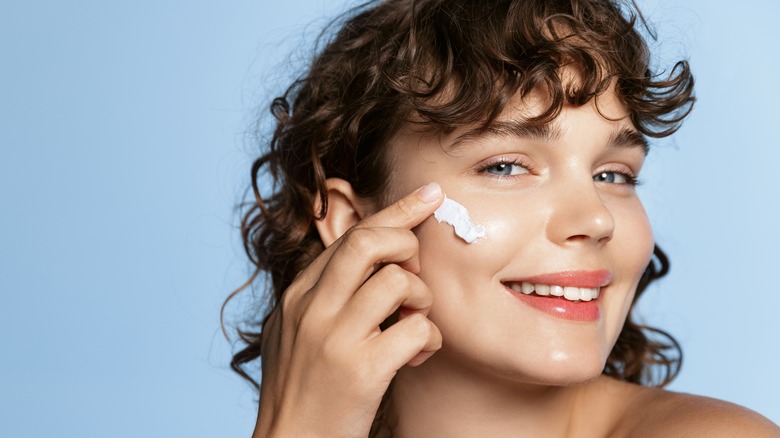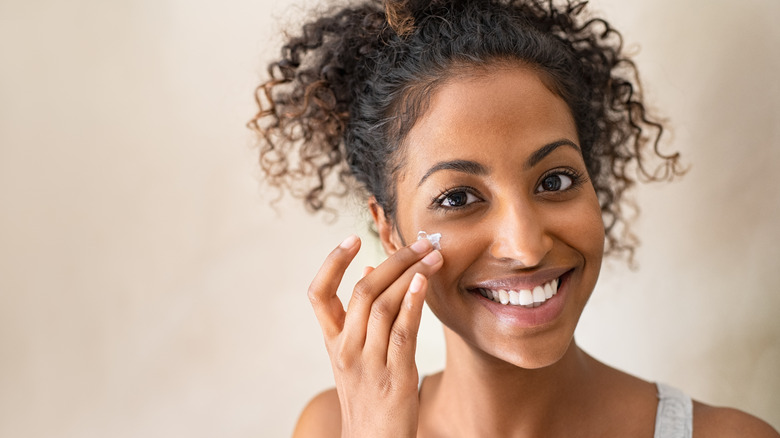The Best Age To Start Using Retinol Is Earlier Than You'd Think
You've probably seen TV commercials featuring retinol creams and serums that claim to stop aging in its tracks. But how well do these products work, and when should you start using them? The answer depends on several factors, including your age, skin type, and beauty regimen.
Retinol, tretinoin, trifarotene, and other retinoids are synthetic forms of vitamin A. These compounds stimulate collagen production, reducing the signs of aging, Harvard Medical School explains. At the same time, they may improve skin color and texture, increase epidermal thickness, and fade dark spots. The most potent retinoid is tretinoin, but retinol and other similar compounds appear to be safer, according to a 2006 review published in Clinical Interventions in Aging.
It's perfectly fine to use retinol daily, but you should first let your skin adapt to it. Also, note that retinoids may not be safe for pregnant women or people with rosacea or other inflammatory skin conditions. Apart from that, it's best to start using retinol sooner rather than later so you can fully reap its benefits.
Start using retinol in your mid-20s to get the most out of it
Collagen levels decrease with age, leading to the formation of wrinkles and fine lines. Cigarette smoking, sleep deprivation, stress, sun exposure, and other lifestyle factors can speed things up, damaging existing collagen fibers, notes Harvard T.H. Chan School of Public Health. On the positive side, topical retinoids can partially reverse these changes and improve skin appearance, according to clinical research presented in the American Journal of Pathology. Therefore, it makes sense to incorporate retinol into your beauty routine from an early age.
"Your mid-20s are a great time to start using retinol," said dermatologist Ellen Marmur in an interview with Vogue. However, this cosmetic ingredient can also be a good choice for teens with comedonal acne, according to dermatologist Ian Webster (via Dermastore). If that's not the case, you may begin to use low-strength retinol creams and serums after age 25 or so. Apply them at bedtime three times a week to see how your skin reacts.
As Dr. Webster notes, using retinol from a young age can help prevent or reduce superficial wrinkles and dark spots. Basically, it's a preventive measure that goes a long way toward skin health. "By encouraging our fibroblasts to keep making collagen, retinol can be used to help pre-juventate, or prevent, the signs of aging in the skin before they start," dermatologist Allison Arthur told Martha Stewart.
How to incorporate retinol into your beauty routine
The benefits of retinol are well-researched, but this compound should be used with caution. Like other retinoids, it can irritate the skin and increase its sensitivity to sunlight, notes the American Academy of Dermatology Association (AAD). For this reason, it's best to choose a product that contains multiple ingredients — not just retinol, said dermatologist Dennis Gross in an exclusive interview with The List. Ideally, look for retinol creams or serums containing ferulic acid, an antioxidant that protects against photodamage.
Anna Chapas, a dermatologist interviewed by the AAD, recommends starting with a product that has the lowest percentage of retinol you can find. Apply it every other night and gradually build your way up, says board-certified dermatologist Tina Alster (via the AAD). Over time, you may begin to use retinol daily to fully reap the benefits. For even better results, use hyaluronic acid and retinol together, as this combo can boost skin hydration and speed up tissue repair.
If your skin becomes irritated, you may still apply retinol once or twice a week, notes dermatologist Ian Webster (via Dermastore). The irritation is temporary and shouldn't occur anymore once your skin has adapted to retinoids. Dr. Webster also recommends alternating between retinol and a cream containing niacinamide, a form of vitamin B3, to soothe irritated skin. Last but not least, Dr. Gross suggests using sunscreen on a daily basis to protect your skin from ultraviolet radiation.

